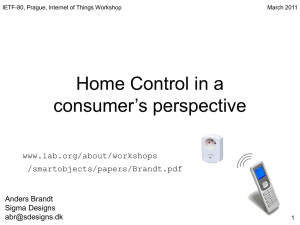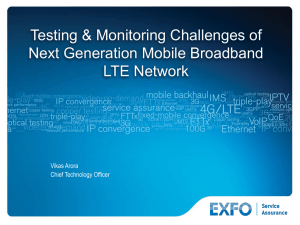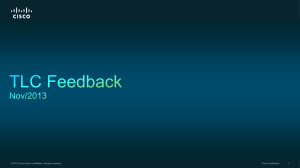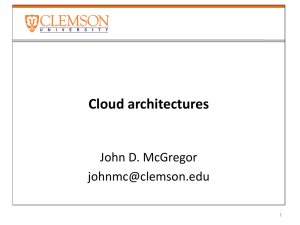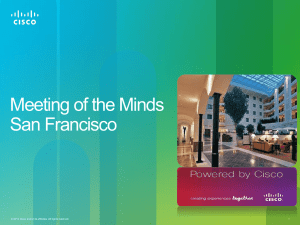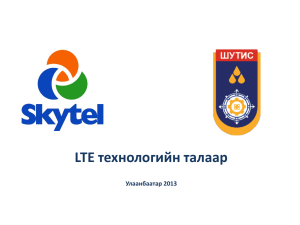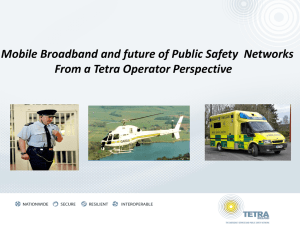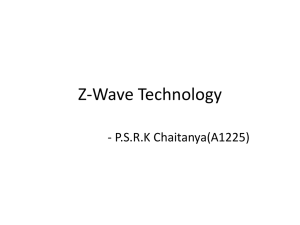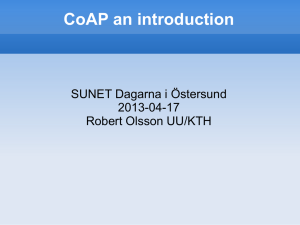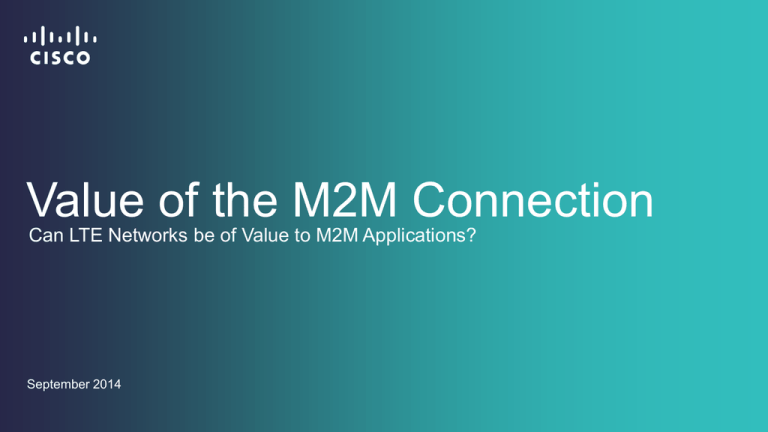
Value of the M2M Connection
Can LTE Networks be of Value to M2M Applications?
September 2014
IoT Application Services Platforms
Devices
Gateway
PHY / Link Network Application
Protocols Protocols Protocols
Field/Personal
Area Network
EPC
WAN
Device
Application
MQTT, AMQP,
CoAP, XMPP
Z-Wave,
ZigBee, IP
802.15.4 / Z-Wave
/ 802.11 / PLC /
Bluetooth / NFC /
Ethernet
Z-Wave,
ZigBee, IP
IP
802.15.4 / Z-Wave 802.11,
/ 802.11 / PLC /
Ethernet,
Bluetooth / NFC / 3G/LTE,
Ethernet
FTTX
IoT Provider
Cloud
Enterprise
Cloud
Application
Enterprise
Application
MQTT, MQP, REST,
CoAP, XMPP WS
REST, WS
IP
IP
IP
IP
802.11,
Ethernet,
3G/LTE,
FTTX
MPLS /
Ethernet
Ethernet
Ethernet
• Platform is OTT
• Network is a Transport Pipe – only provides Connectivity
© 2013-2014 Cisco and/or its affiliates. All rights reserved.
2
Architectural Shift: Network as IoT Application
Services Platform
Devices
Gateway
PHY / Link Network Application
Protocols Protocols Protocols
Field/Personal
Area Network
Dist.
Network
Application
Device
Application
MQTT, AMQP,
CoAP, XMPP
Z-Wave,
ZigBee, IP
802.15.4 / Z-Wave
/ 802.11 / PLC /
Bluetooth / NFC /
Ethernet
•
•
•
•
MQTT,
AMQP,
CoAP,
XMPP
Mca
Mcc
Application
Services
Z-Wave,
ZigBee, IP
Dist.
Network
Application
IP
802.15.4 / Z-Wave 802.11,
/ 802.11 / PLC /
Ethernet,
Bluetooth / NFC / 3G/LTE,
Ethernet
FTTX
Mcc
Enterprise
Mca
Enterprise
Application
Mcc
Application
MQTT,
MQP, REST,
Services
CoAP,
XMPP WS
Application
REST,
WS
Services
Cloud
Cloud
Application
Application
Mcn
Mcn
Mcn
IP
IP
IP
IP
802.11,
Ethernet,
3G/LTE,
FTTX
MPLS /
Ethernet
Ethernet
Ethernet
Network as Global Data Space
•
Service + Transport Integration, Security
•
Devices push data into the Global Data Space.
Applications extract data via pull or push model.
© 2013-2014 Cisco and/or its affiliates. All rights reserved.
Mca
Mca
Application
Services
Mcn
IoT Provider
Cloud
WAN
EPC
Security via strict Access Rights management
Cloud + Fog Model
oneM2M Model
3
Why LTE for IoT
LTE removes major network challenges:
By using LTE as the connection:
CPE can be installed virtually anywhere
As long as have coverage and power*
Other benefits :
IP addressing can be IPv6 so as to scale
to the IoT.
Power to the CPE can be confirmed
simply through radio signaling
Security of the radio link is inherent
LTE is IP based and can scale to billions
of devices
Last mile connection loss is not a
concern
No need to punch holes through firewalls for
the protocols that could change on a regular
basis
No need to have a NAT keep alive
No need for IPSec or SSL for security
No need for Ethernet to be wired to the CPE
No need to configure the WiFi credentials of
the backhaul router for WiFi
802.11u may help in the future though
From this:
Data
Profile
To this:
EP
C-G
Ne
tw
Sta ork
te
Network Awareness
M2
M
W
AS
Data
* Power from battery may be sufficient with UEPCOP
© 2013-2014 Cisco and/or its affiliates. All rights reserved.
4
Why not LTE
Challenge
Solution
Cost of a connection is significant
Reduce the session footprint, increase the
value the connection offers
LTE is not pervasive
Operators may have national coverage but
what about international
Chip sets are expensive
True but coming down and LTE is the future,
2/3G spectrum will be re-farmed
SMS based application so 2G is sufficient
LTE is all IP and IPv6 capable
Wi-Fi is cheaper but is susceptible to
interference
LTE is licensed and spectrum is dedicated
Battery Concern
Devices can sleep
© 2013-2014 Cisco and/or its affiliates. All rights reserved.
5
3GPP MTCe Architectures
IP- SM-GW
SMS/Triggering delivery over T4 defined
Small Data and Device Triggering Enhancements
(SDDTE)
SMS -SC/
GMSC/
IWMSC
CDF/
CGF
No agreement reached
MTC AAA
S6 m
Tsp
Control plane
User plane
Services
Capability
Server
(SCS )
Work item started in release 10, postponed to R13.
Application
Server
(AS )
1
Application
Server
(AS )
2
Gi/SGi
GGSN/
P-GW
T5c
HSS
S6n
Rf /Ga
Monitoring enhancements (MONTE)
SME
T4
MTC-IWF
Tsms
UE Power Consumption Optimizations (UEPCOP)
Gi/SGi
T5 b
T5a
Work item started in release 10, postponed to R13.
HPLMN
VPLMN
Group based feature (GROUP)
Work item started in release 10, postponed to R13.
MSC
MME
MTC UE
Application
RAN
UE
SEES/AESE
New SID in SA1/SA2 for R13. Architecture
Enhancements for Service Exposure
© 2013-2014 Cisco and/or its affiliates. All rights reserved.
Indirect Model
1
Direct Model
2
Hybrid Model
1
SGSN
S-GW
+
2
Um /
Uu /
LTE-Uu
6
Network State Examples
Provide APIs for the M2M applications to query session / device data
Identity mapping
session info (APN, QoS, IMSI, PLMN), Session status (active/offline)
MT
Roaming status
CI
WF
E & SGs
Location
S6a
SLA
PC R
HSS/AAA/
F
Sh
SPR
Network congestion status
M
Provide ability for the application to
subscribe to notifications
S1u
S6m
PC
R
F
Tsp
ME
Gx
S6b
Gx
S11
M2
PG
W
SG
W
SGi
S5
CDR
CD
CG F /
F
SC
S
Policy
Core
S1-AP
Access
Mobility events
Location changes
Roaming status changes
Congestion status change
KPI threshold exceeds
MT
CI
WF
T4
M
AS
M2M App
State
Exposure Function
© 2013-2014 Cisco and/or its affiliates. All rights reserved.
7
GSMA oneAPI
The GSMA oneAPI is the 3GPP method to expose network function to 3rd parties.
The following capabilities are supported in version 3 of the oneAPI specifications:
Location
SMS
MMS
Payment
Device Capability
Data Connection Profile
Third Party Call
Anonymous Customer Reference
REST based with the option to subscribe to notifications
Some operators advertised as using the framework
Use cases may not be appropriate for bulk M2M applications
3GPP R13 SEES/AESE work looking at OMA and GSMA platforms
© 2013-2014 Cisco and/or its affiliates. All rights reserved.
8
MONTE Framework
HSS
• SCS/AS (M2M Application)
subscribes to service
provider for device events
• API GW decides which
network element to install
triggers to report the event
SGSN
/MME
Sh
API
GWF
SCS / AS
Online Charging
System
(OCS)
SPR
S6m
Sp
Rx
SGSN/MME
PCRF
Sy
Rf
Gxx
API
GWF
HSS
Sd
Gx
SCS
/AS
Gy
1. Monitoring Request
2.Authorization &
load control
BBERF
TDF
PCEF
PCEF
Gz
3. Sh-Subs-Notif
4. Subs-Notif
Offline
Charging
System
(OFCS)
Gateway
5. Subs-Notif Resp
6. Sh-Subs-Notif Resp
7. Monitoring Request Response
© 2013-2014 Cisco and/or its affiliates. All rights reserved.
9
Architecture Enhancements for Service Exposure
Change “exposure layer” to
SCEF
Adds description of
“Abstraction” along w/ other
minor changes
Adds an example by way of
SMS to show how SCEF can
be employed
SCEF
SMS oneAPI
SMS Capability Exposure
OPERATOR DOMAIN
3rd party
Application
OMA/
GSMA
SMS Abstraction
E.g.
Tsms,
T4
3GPP
SMS-SC/
GMSC/
IWMSC
© 2013-2014 Cisco and/or its affiliates. All rights reserved.
10
MTC Application Monitors the Location Device
MTC application receives notification when normally fixed device is moved
API
© 2013-2014 Cisco and/or its affiliates. All rights reserved.
11
API
Device Check
Why Ping when a TAU is nearly
the same
M2M server makes simple
request to report when devices do
not report in
API GW installs the subscription
for TAU reports for this M2M
customer
MME reports successful TAUs
API GW determines that after the
TAU timer, one is missing and
reports to M2M server
© 2013-2014 Cisco and/or its affiliates. All rights reserved.
12
MTC Application Delays Sending Data
MTC application delays sending data until device becomes active
Details: MTC application registers to be notified when device activates. Once device active sends data.
API
© 2013-2014 Cisco and/or its affiliates. All rights reserved.
13
Network Connection Status Value
3GPP, OMA, GSMA, Services Providers and vendors are designing
solutions to expose network state to 3rd parties
Exposure layer simplifies the implementation to 3rd parties
However adds complexity (cost) to SP’s
Is the cost/benefit there?
Network SLA and protection sufficient?
Are there sufficient use cases that need awareness?
What will M2M applications need from their connection to the Internet?
© 2013-2014 Cisco and/or its affiliates. All rights reserved.
14
Thank you.


